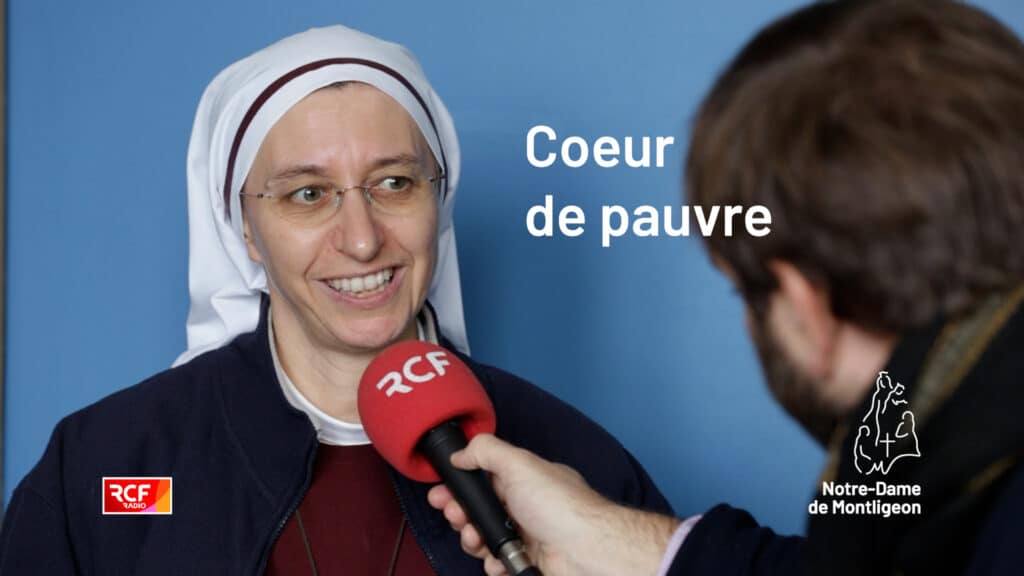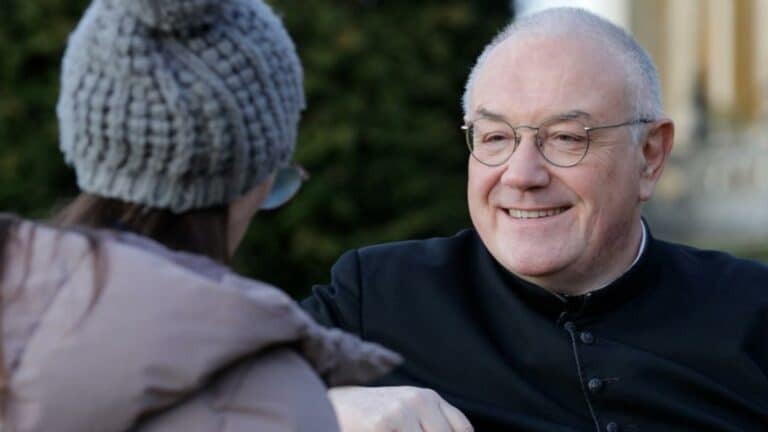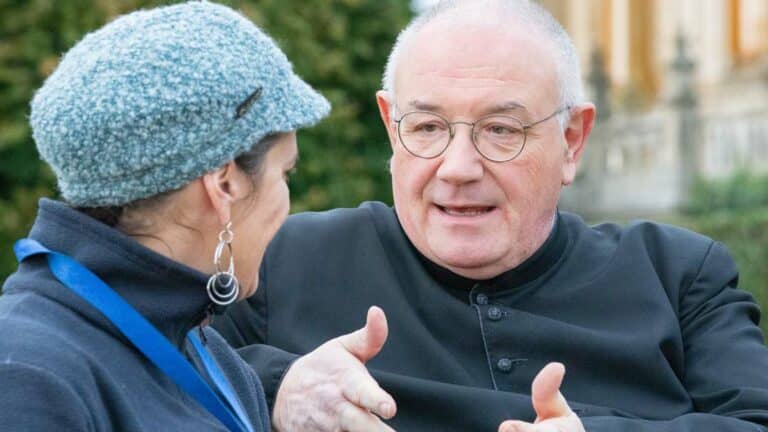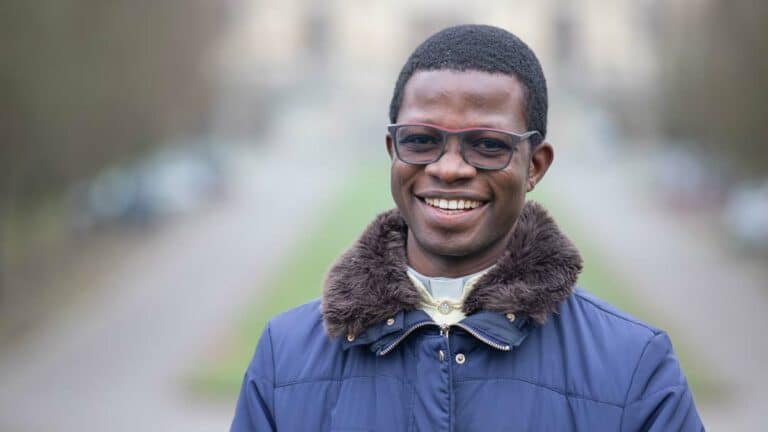“It is easier for a camel to pass through the eye of a needle than for one who is rich to enter the kingdom of God.” The Gospel recommends not to get blinded by material goods but to rather seek prayer and humility instead… Is this warning to be taken literally? What does it mean to be poor at heart? Interview of Sr. Cecilia by the regional RCF (French Catholic Radio).
In the Gospel, rich people don’t have good press? Is money a handicap for entering the Kingdom of God?
The issue of money and wealth is rather present in the Gospel. Jesus warns against greed and uses for that several parables, such as the one of a man who heaps so much wheat that he intends to build bigger barns to store ever more harvest. If he dies that evening, what will become of it all? It raises questions. Similarly, at first sight in reading the Gospel one could think that’s it’s not worth being wealthy. And, moreover, if we have the misfortune to be wealthy, what await us in heaven?
Further to the parable of the rich young man who went away sorrowful for he had great possessions, Jesus carries on and uses another image. That of a camel for which it is easier to pass through the eye of a needle than for one who is rich to enter the kingdom of God. Upon hearing such narratives, the apostles are utterly dismayed and truly wonder who could be saved.
Can’t any rich people enter the Kingdom of God?
The Scriptures does report several instances of wealthy characters among the righteous. For example, Job who was said to be the wealthiest throughout the Eastern world. Yet, he will get to lose all his wealth, goods and family, but he will get to make a real turnabout. He will be among the ones to find salvation. Zacchaeus too is a wealthy man but Jesus comes to him and invites himself to his home, and simultaneously opens the door of his heart.
In turn, Zacchaeus will enter a path to holiness. At the time of Jesus’ burial, we find yet another rich man, an eminent figure: Joseph of Arimathea. So we see that rich people too can walk the path to holiness. When you read about the life of saints, you discover numerous wealthy people such as, Saint Louis King of France, for instance. Are wealth and holiness in total opposition? Let’s not be too eager to take such a shortcut.
Saints too have experienced wealth. In our Normandy, let’s us recall the father of St. Therese of Lisieux, Saint Louis Martin; he was both a rich and holy man. Indeed, his family was part of the bourgeoisie; he had earned money with his watchmaking business, but at the same time, he was most generous to the destitute, regardless of his being wealthy. Our contemporary mind is rather affected by the notion of class struggles but we need to go a little further in our reflection. Let’s not jump to a hasty conclusion stating that not to be wealthy is the answer!
Does money actually hinder the work of God in us?
Jesus warns us against money because it relays a great danger, that of greed which can totally hinder the work of God. One needs money. It’s a good servant but it’s a bad master. When it becomes the boss, it provides us with quite a certain comfort, which can very soon turn us into self-centred people. The temptation then is to be utterly self-sufficient while, at the same time, growing and remaining deaf and blind to others’ distress. It’s not automatic, but you need to keep aware of such a risk.
A self-sufficient heart does not expect anything from anyone. When this prevails, the relationship gets annihilated somehow since one opted to keep away from others to a certain extend. In the parable of the poor man Lazarus, the rich man dies and is faced with an unbridgeable, inescapable and eternal gap keeping him away from the poor man who is saved. This epitomizes the danger of wealth.
Moreover, money makes us fall into a kind of “never ending”spiral, that of always seeking more money, and more possessions. This is one of its great lures. In the desert Jesus was three times subjected to temptations and the very first of them was precisely that of possessing. This very temptation of greed leads us to fall prey to the others: that of wanting glory, honour, recognition and, finally, that of power and pride. The spiral is most significant, it can very quickly lead us away from God. The prodigal son, for example, blew all his inheritance until he was left isolated and destitute. So, in a certain way, money leads to isolation.
What can one do to have a poor man’s heart?
We need to be able to check if there are attachments lurking in our inner heart. What is the cursor of our attachment to goods? Are we able to give to charities? If so, how do we feel in doing so? Let us be attentive to what is going on in our heart.
But money is not the only issue. It is not so much about being rich or poor but about one’s relationship to poverty and wealth. You can be poor and yet not be close to God. Being in anger or hatred against rich people is not being holy. Jesus invites us to experience poverty at heart. A poor heart is sufficiently detached to not be self-sufficient. The poor at heart is someone who needs others, per say. He expects everything from others.
So this attitude of heart can relate to material but also to intellectual or spiritual levels: do I expect everything from God or do I live my life without him? Not needing God also means not to be poor at heart.
The poor at heart empty themselves ever more, so as to be able to receive and be filled with what is to come their way, at all times. If we consider relationships for example, a certain meekness is required to be able to entertain someone’s friendship. Otherwise, the relationship is ill-adjusted. To be meek and be poor at heart is to allow oneself be hollowed out by this dependence to others, and to accept not to be self-sufficient.
Does death put rich and poor on equal footing?
Death does put everyone on equal footing. In death we shall all experience real and utter poverty: a time when we totally remit ourselves in someone else’s hands. it may be easier for the poor at heart to go through this motion as one has to get prepared now and every day. Pope Francis likes to say that shrouds present no pockets! Our earthly possessions will be useless to us.
I really like this story about a rich man who reaches heaven. Saint Peter welcomes him and guides him through to the place of his dwelling. They pass through gorgeous residences, then on to pavilions with beautiful gardens, then onto more humble quarters presenting council lodgings. Yet, St. Peter carries on. The rich man is surprised and enquires. Saint Peter, upon checking his list, replies: “Please trust me! With what you brought, we couldn’t spare more!” showing the rich man to his shed.
This story illustrates the fact that the only wealth that we are to bring with us in the afterlife is the love we’ll have sown during our earthly life. Saint Therese, who sowed a great deal of love during her life, said that she would present herself empty-handed to God. She had perceived that all the charity she may have displayed while on earth had been merely possible thanks to the grace of God. What do you have that you did not receive?
Is purgatory also a time for realizing poverty at heart?
Death is no small matter. Who can be sure that he will present himself entirely poor before God? This is certainly the case of the Repentant Thief. But as for us, we can expect to still have to undergo purifications due to the consequences of our greed, and in relation to all the things to which we remained attached. Purgatory is a time for realizing poverty at heart.




